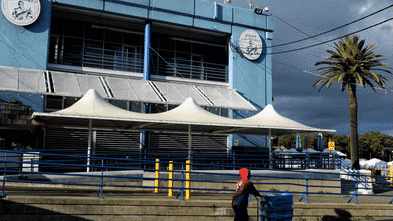URGENT UPDATE: Tensions in Venezuela are escalating as the U.S. Navy mobilizes naval forces in the Caribbean, raising fears of imminent conflict in the region. This development follows significant geopolitical maneuvers concerning Venezuela’s vast oil reserves and its contentious relationship with neighboring Guyana. The situation is precarious, with potential implications for stability across Latin America.
New reports confirm that military assets have been positioned off the coast of Venezuela, a clear warning to President Nicolás Maduro regarding his government’s actions. The U.S. alleges that Maduro is facilitating a drug trafficking network known as the “Cartel of the Suns,” which serves as a proxy war against U.S. interests. This mobilization signifies a shift in U.S. foreign policy focus back to the Americas, echoing themes from the historic Roosevelt Corollary of 1904.
The backdrop to this crisis is rooted in Venezuela’s spiraling economy, heavily reliant on oil, which constitutes over 90% of its income. However, due to both sanctions and economic mismanagement, the country is facing an unprecedented collapse, with Maduro claiming a staggering 100% reduction in oil revenue attributed to U.S. sanctions. The social reforms implemented under former leader Hugo Chávez have nearly vanished, leaving millions in dire conditions.
As the U.S. increases its naval presence, the potential for conflict over the Essequibo region—a disputed territory with Guyana—looms larger. Maduro has publicly condemned foreign drilling operations in this contested area, branding them as an affront to the Venezuelan people. This rhetoric intensifies as the U.S. moves destroyer fleets into the region, signaling readiness to intervene should tensions escalate further.
The implications of these developments are severe. Experts warn that Venezuela is nearing a tipping point, with the risk of civil unrest transforming into broader regional violence. External actors, including Russia and China, have already begun to engage in the Venezuelan crisis, complicating the dynamic and increasing the stakes for all involved.
Historically, the legacy of Simón Bolívar, who once declared, “America is ungovernable for us,” resonates deeply in today’s Venezuela. His insights into the challenges facing newly formed republics underscore the precarious nature of political stability in the region. As the U.S. navigates its interventionist strategies, the notion of realpolitik prevails, prioritizing interests that align with powerful oil corporations.
Analysts are closely monitoring the situation as it unfolds. 2025 predictions suggest that U.S. military buildup could lead to rapid deployments, although a full-scale invasion is not considered imminent. Still, the potential for a violent eruption remains high, with critics asserting that the narrative for intervention against Venezuela is being constructed in real-time.
As tensions mount, the humanitarian impact in Venezuela could be catastrophic, with millions already suffering from hyperinflation and food shortages. The world watches, uncertain of what the next move will be.
Stay tuned for live updates as this situation develops. The ramifications of U.S. actions in the coming days could reshape not only Venezuela but the entire geopolitical landscape of the Americas.

































































